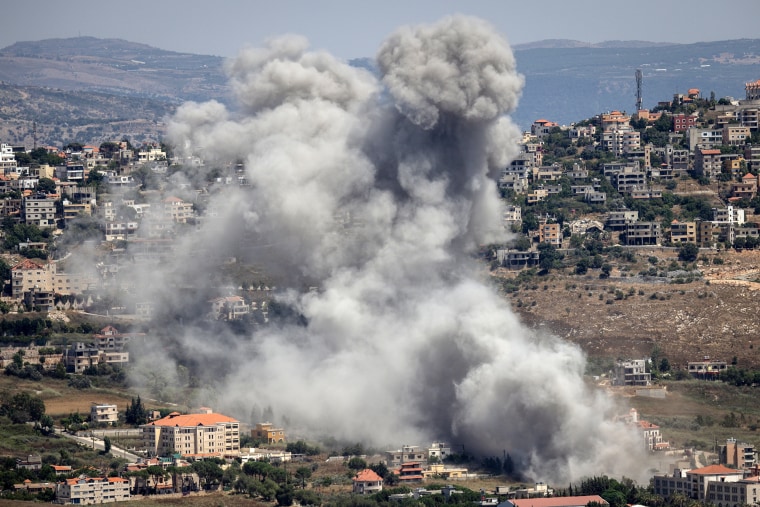The U.S. readies to evacuate Americans from Lebanon if fighting between Israel and Hezbollah intensifies


TEL AVIV — The Pentagon is moving U.S. military assets closer to Israel and Lebanon to be ready to evacuate Americans as fighting between Israel and Hezbollah intensifies, according to three U.S. defense officials and a former U.S. official familiar with the plans.
The USS Wasp, an amphibious assault ship, and Marines from the 24th Expeditionary Unit, which is special operations capable, moved into the Mediterranean on Wednesday to join the dock landing ship USS Oak Hill and another ship in their amphibious ready group, according to the Marine Corps. The Wasp will operate in the eastern Mediterranean to be ready for a Military Assisted Departure and other missions, the officials said.
The Wasp and the Marine Expeditionary Unit are also intended to project military power and be a deterrent to regional escalation, according to a U.S. official familiar with the plans.
The move comes as tensions continue to mount and cross-border fire increases between Israel and Hezbollah in Lebanon. U.S. officials are increasingly concerned that Israel is going to carry out airstrikes and a possible ground offensive in Lebanon in the coming weeks, the officials said.
Despite pressure from the Biden administration, Israeli officials have remained firm in their desire to go after Hezbollah in Lebanon, according to U.S. officials familiar with the conversations. Israel hopes to create a 10-mile buffer zone above the Lebanese border, according to U.S. and Israeli officials.
Israel wants to move Hezbollah farther away from the border and is pushing for a diplomatic solution, but if that does not work the Israel Defense Forces are ready to use force, an Israeli official said.
The goal is to return quiet to northern Israel so that 60,000 Israelis who have left in the past eight months because of Hezbollah rocket fire can go home, the official said.
The Marines from the 24th Marine Expeditionary Unit are trained to help civilians flee dangerous environments. The Wasp also has offensive and surveillance capabilities, and can deploy F-35s, U.S. long-range stealth fighters.
The U.S. is also talking to close allies to coordinate evacuations and any coalition military operations, according to U.S. defense officials.
Israeli Defense Minister Yoav Gallant has been in Washington, D.C., this week to meet with top Biden administration officials.
Iran and its Hezbollah proxies are not looking for an all-out war with Israel and prefer the current situation, which puts Israel under international pressure, according to current and former U.S. officials and Western officials. The fighting in Gaza and in the north is draining Israel’s military, fueling internal political divisions and building tensions with Israeli allies.
U.S. officials continue to say they don’t see evidence yet that a major escalation is imminent but warn that it just takes one strike or miscalculation to escalate the situation quickly. The pressure on Israel to act from its citizens in the north is “very real,” one U.S. official said. Israeli officials feel the need to do something, a U.S. official said. “They feel the status quo is unsustainable.”
On Thursday, the U.S. Embassy in Beirut warned Americans to reconsider travel to Lebanon. “The security environment remains complex and can change quickly,” the alert warned.
The State Department estimated in 2022 that 86,000 Americans live in Lebanon. In 2006, the U.S. evacuated 15,000 people from the country during Israel’s war with Hezbollah.
Many aid organizations have already evacuated dependents of their staff from Lebanon, according to a source with direct knowledge of the matter.
The CBC reported that Canada is preparing contingency plans to evacuate about 20,000 Canadians from Lebanon and that allied military leaders met Tuesday to discuss options.
Canada is preparing contingency plans to evacuate about 20,000 Canadians from Lebanon, officials in Ottawa said.
Canada’s Department of National Defence said that Canadian armed forces are in contact “with allies and like-minded nations, monitoring the global landscape to maintain awareness of upcoming threats that may result in requests to support Canadians and Canadian interests.”
Asked whether the U.S. is taking more precautions in the region as tensions mount between Israel and Hezbollah, White House national security spokesperson John Kirby said Wednesday, “It’s something we’re watching very closely. We continue to monitor. We also modify force protection procedures and protocols as the threat changes.”
In a statement, Adrienne Watson, a spokesperson for the White House National Security Council, said restoring calm along the Israel-Lebanon border “remains a top priority for the United States and must be of the utmost importance for both Lebanon and Israel. We continue to work toward a diplomatic resolution that would allow Israeli and Lebanese citizens to safely return to their homes and live in peace and security.”
